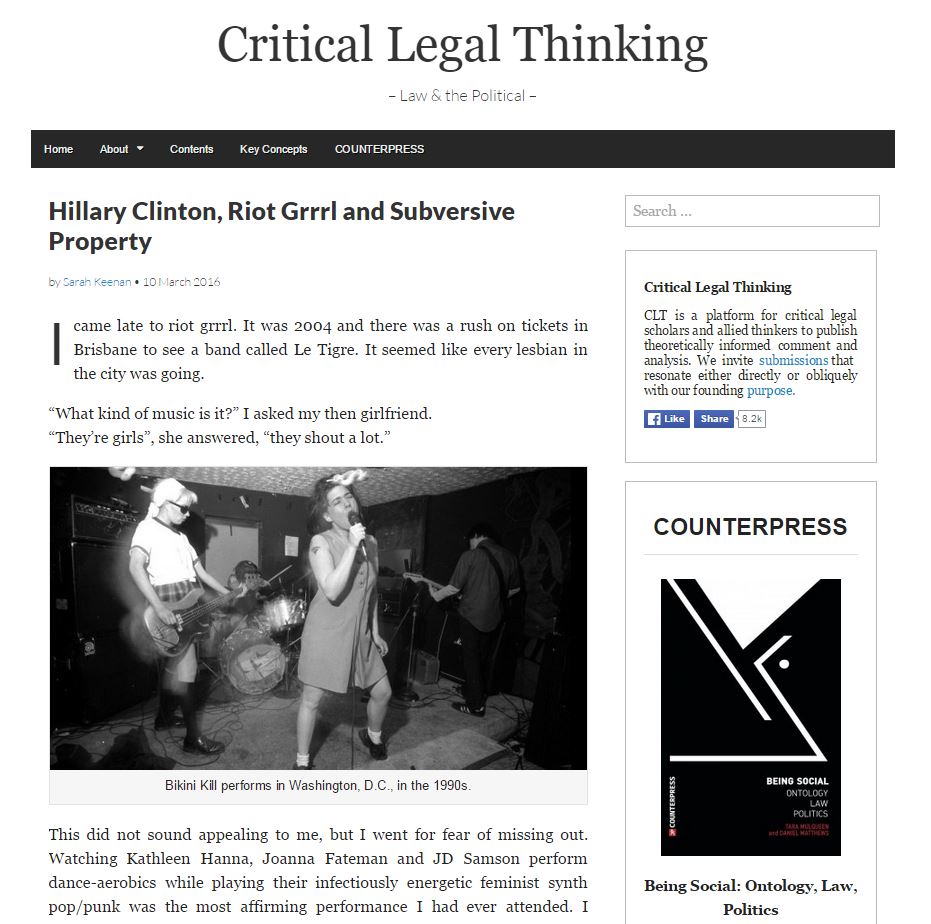This post was contributed by Dr Sarah Keenan, lecturer at Birkbeck’s School of Law. Her book ‘Subversive Property: Law and the Production of Spaces of Belonging’ is published by Routledge.
This post was originally published on Critical Legal Thinking on Thursday 10 March
I came late to riot grrrl. It was 2004 and there was a rush on tickets in Brisbane to see a band called Le Tigre. It seemed like every lesbian in the city was going.
“What kind of music is it?” I asked my then girlfriend.
“They’re girls”, she answered, “they shout a lot.”

Bikini Kill performs in Washington, D.C., in the 1990s. (Image copyright Pat Graham / www.patgraham.org)
This did not sound appealing to me, but I went for fear of missing out. Watching Kathleen Hanna, Joanna Fateman and JD Samson perform dance-aerobics while playing their infectiously energetic feminist synth pop/punk was the most affirming performance I had ever attended. I bought their three album back catalogue the following day, started reading up on them, and discovered Bikini Kill, Kathleen Hanna’s previous band, one of the founding bands of the riot grrrl movement.
Riot grrrl began as a group of bands playing hardcore feminist punk on the northwest coast of the USA in the early 90s, and grew into a cultural force which continues to influence DIY culture and ‘third wave’ feminism today. Rather than political lobbying, riot grrrl feminism was and is focused on women creating spaces where they can create music and other art, exchange ideas and embrace punk’s anger while completely rejecting its machismo. While riot grrrl was by no means a perfect political movement – most significantly, it was very white-dominated – it did forge a new kind of grassroots anti-establishment feminism that continues to inspire and provide a psychic home for many women, queers and nerds.
It’s now eleven years since that Le Tigre gig, and barely a week goes by without my playing a track from this feminist punk genre. The discordant pain and uncensored rage of riot grrrl music, balanced by its sharp irony and humour regularly helps me to leave home in the mornings, and recover when I return. Riot grrrl, together with the new wave, post-punk and queercore genres that followed, have profoundly helped to shape my view of the world and my place in it.
I was sickened at the discovery that ‘Rebel Girl’, a classic Bikini Kill track, had been used in a recent promotional video for Hillary Clinton’s presidential nomination campaign. Clinton — former US Secretary of State and multi-millionaire Democratic Party establishment figure, who voted for the war on Iraq, has consistently supported Western military intervention in North Africa and the Middle East, sat on the Wal-Mart board of directors while the company waged a campaign against unions, retains complex and significant ties with corporate power, and whose friend and supporter Gloria Steinem recently suggested that young women supporting Bernie Sanders are doing so to get attention from ‘boys’ — is not a rebel girl.
https://www.youtube.com/watch?v=DzMGqVh8G20
While Clinton is keen to claim the feminist label, her proven commitment to US capitalism and imperialism mean that her feminist politics will only ever be narrow, white and liberal. For Clinton’s capitalist-loving, war-mongering machine to exploit the radical, grassroots, anti-establishment, DIY-sound of riot grrrl was a particularly offensive co-optation.
Within a few days of the Clinton campaign releasing the video, Tobi Vail, Bikini Kill drummer and feminist punk icon, responded by issuing YouTube a copyright infringement notice. As a result, the video was taken down. Now those clicking on the link get this.
Unsurprisingly, copyright and other forms of intellectual property are not generally associated with the riot grrrl movement. Vail filed the notice reluctantly, stating in an interview:
I was seriously trying to just ignore it (because I’m not so into telling people what to do and that song has a life of its own and I’m just one person in the group Etc Etc) but Bikini Kill fans and friends would not allow it… it’s basically an advertisement… we don’t authorize use of our songs in advertisements…
It was not the royalties that mattered to Vail. She was not seeking to enforce a right to exclusively possess the song; as she said, it ‘has a life of its own’. Rather, issuing the notice was about retaining political integrity and meaning for ‘Rebel Girl’ and for the riot grrrl movement more broadly. The fact that it was Bikini Kill fans who ‘would not allow’ this track to be used by the Clinton campaign is significant. Part of the joy and momentum that powered the riot grrrl movement was the space that it created for fans — primarily young women — not only to consume music and ideas, but to participate in their making and to take ownership of them. Riot grrrl belongs to its fans, who in turn constitute the movement.
Building a space of belonging for girls and queers who did not otherwise feel safe anywhere, including in their family homes, was central to riot grrrl. This centrality is made clear in recent reflective pieces written by key figures in the movement. In ‘Run Fast’, the title track of Kathleen Hanna’s current band, The Julie Ruin, Hanna looks back on riot grrrl as a movement of collectively making space and forging identities:
in the end we made
tiny islands where we didn’t always have to be afraid.
In her recent memoir, Carrie Brownstein of Sleater-Kinney similarly describes her journey from riot grrrl fan to key player as one of creating a particular kind of space.
I’ve always felt unclaimed. This is a story of the ways I created a territory, something more than just an archipelago of identities, something that could steady me, somewhere that I belonged.1
When Vail issued the copyright notice on the Clinton video, it was to protect the space of belonging that has been carved out by riot grrrl over the last three decades. While property tends to operate in the interests of power, it can also be used as a tactic to subvert hegemonic relations of belonging and create new ones.
While lawyers tend to emphasise the right of exclusive possession that comes with property, feminist writers have highlighted the importance of belonging.2 Belonging is a more complex concept than exclusion: while it relates to questions of ownership and possession, it is also about identity — about fitting in and feeling safe or ‘at home’.
In my work on property, I have argued that property can be best understood as a relationship of belonging that is contingent on space. My relationship of belonging with riot grrrl culture, for example, will constitute property while I am at an L7gig (yes, they have recently reformed), where I will stride in like I own the place, confidently take up space in the crowd, sing/shout along to the choruses, laugh at jokes about tampons and exchange knowing glances with other fans. But my relationship of belonging with riot grrrl culture will not provide me with any of the privileges of membership or ownership were I to attend a classical music performance at the Southbank Centre. My attribute of being a riot grrrl fan will operate as property in some spaces but not in others.
More significantly, if we accept that attributes such as whiteness, masculinity and heterosexuality are relational rather than essential or biological, then we can agree with writers such as Cheryl Harris3 and Margaret Davies4 that such attributes can constitute property — they are relations of belonging. However, those attributes will only function as property if they exist within broader spaces that give them power and meaning. Whiteness will only constitute property while we continue to live in a white supremacist world. Similarly, masculinity will only constitute property while we continue to live in a patriarchy, and so on. This analysis means that if the normative goal is to challenge the way whiteness and other identity categories operate as structures of exploitation and oppression, then it is the spaces that privilege whiteness etc which must be undermined and challenged. We need to build different spaces, as the riot grrrl movement did.
Understanding property in this way allows for property to be subversive. The spaces that give power and meaning to relations of belonging are not fixed and do not have to empower relations that are oppressive, exploitative or conservative. Property is experienced in complex and overlapping ways not solely determined by law.
Property can be productive of social goods in a way that subverts hegemonic power relations. By creating spaces where young women, queers, punks and nerds not only belong but also feel ownership of what is produced, riot grrrl was and is a powerful materialisation of subversive property. By preventing (or at least delaying and inhibiting) Hillary Clinton from using Bikini Kill to fuel her campaign for the ultimate position of establishment power, Vail’s copyright notice was an effective assertion that this music and the psychic and material space it created still belong to us.
Find out more
Article footnotes:
- Carrie Brownstein, Hunger Makes Me a Modern Girl (Riverhead Books 2015) 11. ↩
- Brace, Laura, The Politics of Property: Labour, Freedom and Belonging (Edinburgh University Press, 2004); Cooper, Davina, “Opening Up Ownership: Community Belonging, Belongings, and the Productive Life of Property” Law & Social Inquiry 32, no. 3 (2007): 625-664; Keenan, Sarah, Subversive Property: Law and the Production of Spaces of Belonging (Routledge, 2015); Strathern, Marilyn, “Cutting the Network” Journal of the Royal Anthropological Institute (1996): 517-535. ↩
- Harris, Cheryl I, “Whiteness As Property” Harvard Law Review 106, no. 8 (1993): 1707-1791. ↩
- Davies, Margaret, “Queer Property, Queer Persons: Self-Ownership and Beyond” Social and Legal Studies 8, no. 3 (1999): 327-352. ↩


